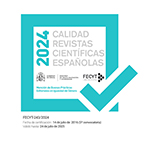Cuestiones éticas en la intervención con familias y menores
Resumen
La finalidad del presente artículo consiste en analizar el ejercicio de la responsabilidad ética en el ámbito de la intervención familiar. En primer lugar, se señala que la atención a la familia, infancia y adolescencia tiene una doble función: por una parte, las distintas medidas de apoyo a la familia con problemas sociales; por otra parte, la atención y protección del menor en situaciones de riesgo social. En segundo lugar, se destaca que es el mandato social lo que configura la identidad y práctica ética del profesional, en un ámbito en el que los dilemas no son sólo entre normas éticas, sino también morales y jurídicas. Teniendo esto en cuenta, se apuntan una serie de cuestiones relevantes en la ética de la intervención familiar. La intervención familiar implica el ejercicio de competencias con gran incidencia en la vida de las personas. Así, resulta fundamental que las instituciones y profesionales reconozcan estas cuestiones y las incluyan en sus programas de formación profesional junto a la creación de instrumentos de reflexión crítica sobre la ética de la atención a la infancia, familia y adolescencia.Descargas
Descarga artículo
Licencia
La revista Cuadernos de Trabajo Social, para fomentar el intercambio global del conocimiento, facilita el acceso sin restricciones a sus contenidos desde el momento de su publicación en la presente edición electrónica, y por eso es una revista de acceso abierto. Los originales publicados en esta revista son propiedad de la Universidad Complutense de Madrid y es obligatorio citar su procedencia en cualquier reproducción total o parcial. Todos los contenidos se distribuyen bajo una licencia de uso y distribución Creative Commons Reconocimiento 4.0 (CC BY 4.0). Esta circunstancia ha de hacerse constar expresamente de esta forma cuando sea necesario. Puede consultar la versión informativa y el texto legal de la licencia.









